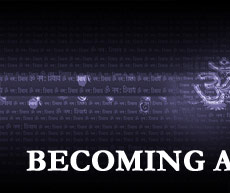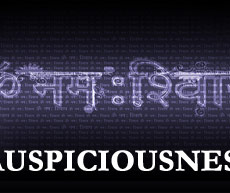Sathya Sai Speaks
Shivarathri is indeed a very auspicious day. It is the fourteenth day of the lunar fortnight, when the Moon is waning and the Sun is in the sign of Aquaries. The festival is, however, related to the Moon rather than the Sun. That is the reason why it is called
Shivarathri (the night of Shiva). Unlike other nights, this particular night is the night of consecration, dedication and illumination.
The mind is intimately associated with the Moon.
Chandhra (the deity of the Moon), is the presiding deity of the mind. He loses one sixteenth of his brilliance every day after the Full Moon day and continues waning until on this night when he is left with just one sixteenth of his power. The waned Moon maybe taken to stand for the mind with all its vagaries and waywardness reduced after it has been conquered by
sadhana (spiritual discipline).
Have high ideals. Strive to elevate yourselves; endeavour for the Highest Goal - God. Whatever the obstacle or opposition, do not be disheartened. Give up the animal in you, stablise yourselves in human virtues and proceed boldly towards the achievement of Divinity.
On this night there is just a minute part of the mind left to be conquered and that can be done by keeping vigil and dwelling on the Glow of God. The vigil that is prescribed is symbolic of the eternal vigil one has to observe, while the rite of fasting is symbolic of divesting the senses of the pleasures they crave for.
The night-long bhajan (congregational singing of devotional songs) is significant of the life-long consciousness of the Divine Presence that every one should cultivate. The rites and vows laid down for Shivaraathri being absent on other nights of the year, their observance on this day comes as a reminder that they are useful.
There are three types of men - the multi-centred, the uni-centred and the non-centred. The first group, who allow their senses, mind and intelligence, to wander where they will, is a very populous group. So also is the third group, which comprises people who flit from one object to another, hop around from one thing to another in listless flippancy.
For earning the concentration and single-centredness which is characteristic of the second group, the festival of
Shivarathri is very propitious. The
bhajans and the ceaseless flow of
keerthans (songs) and
namasmarana (remembering God's name) on this occasion help in the attainment of single-centredness.
You must realise that
bhajan, naamasmaran and
puja (ritualistic worship) are not for pleasing or propitiating God, but for our own spiritual progress. Frequently people flatter the rich and the powerful - especially when they are in their employment or are beholden to them for some precious help - in order to induce them to shower gifts on them.
But God does not shower Grace on people because they sing His praises. Nor does He come down upon them because they do not deify Him. Recitation of the Divine attributes only enables us to dwell on elevating ideals and approximate ourselves more and more to the Divinity that is our true nature.
Think, plan and do only good; speak and act only good. Then as a result you will approximate God, the source of all good. This is the message of Shivaraathri.
We become what we contemplate. By constant thought an ideal gets imprinted on our heart. When we fix our thoughts all the time on the evil that others do, our mind gets polluted by the evil. When, on the contrary, we fix our mind on the virtues or well-being of others, our mind is cleansed of wrong and entertains only good thoughts.
No evil thought can penetrate the mind of a person wholly given to love and compassion. The thoughts we indulge in, shape our nature; along with others, they affect us too. For example when a flash is fired to photograph someone, his face is lit; but so, too, to a certain extent, is the face of the photographer.
The only way to become Brahman is to be ever immersed in contemplation of Brahman.With a lump of salt on one's tongue, how can anyone relish the sweetness of honey or fruits? With a lump of candy on the tongue, how can the taste of salt and savoury be known?
When a municipal truck full of refuse passes by, you are affected by the bad smell even though you may be standing afar. Similarly, a thought may be momentary or trivial, yet its effect on the mind cannot be avoided. It was because the ancient sages knew this important truth that they declared: "He who knows
Brahman becomes
Brahman." The only way to become
Brahman is to be ever immersed in contemplation of
Brahman. With a lump of salt on one's tongue, how can any one relish the sweetness of honey or fruits? With a lump of candy on the tongue, how can the taste of salt and savoury be known?
Let us connect to the Source of all Goodness
and sanctify our lives
Immerse your mind in good thoughts and world will be good; soak it in bad thoughts and the world will be unpleasant for you. So, recollect only good; think, plan and do only good; speak and act only good. Then as a result you will approximate God, the source of all good. This is the message of
Shivaraathri.
According to numerology, the first three syllables of the word
Shivarathri -
shi,
va and
ra - connote the numbers 5, 4 and 2, and the fourth syllable,
thri, means 'three.' 5, 4 and 2 make one whole; one composite picture of the eleven
rudhras.
Rudhra means "the one who makes man weep." The eleven
rudhras are: the five senses of perception, the five senses of action, and the mind. These, by leading him astray in pursuit of trivial and transitory pleasures, ruin him and make him weep.
But the
aathman, if it is sought and relied upon, sheds its rays on the eleven and makes them meaningful partners in the progress of man towards self-realisation.
The rays from the
aathman illumine the intelligence, the illumined intelligence alerts the mind and the alerted mind gets control of the senses, making the path clear for the person to proceed through knowledge to wisdom…
Have high ideals. Strive to elevate yourselves; endeavour for the Highest Goal - God. Whatever the obstacle or opposition, do not be disheartened. Give up the animal win you, stablise yourselves in human virtues and proceed boldly towards the achievement of Divinity. Do not waver, going today to
bhakthi (devotion), tomorrow to sensual gratification and the day after again to
bhakthi.
When everything is successful you are all for devotion; when something goes wrong you are filled with despair; when discipline is enforced you start holding back and when love is showered, you are foremost. This dual attitude must be given up.
Have auspicious thoughts, speak auspicious words and do auspicious deeds. And as a result of this, attain the Embodiment of Mangala (auspiciousness), Shiva Himself.
- Divine Discourse on Maha Shivarathri, Brindavan, March 7, 1978
Dear Reader, how did you like this excerpt from His Divine Discourse? Please share your reflections with us by writing to
[email protected] mentioning your name and country. Thank you for your time.
- Heart2Heart Team



